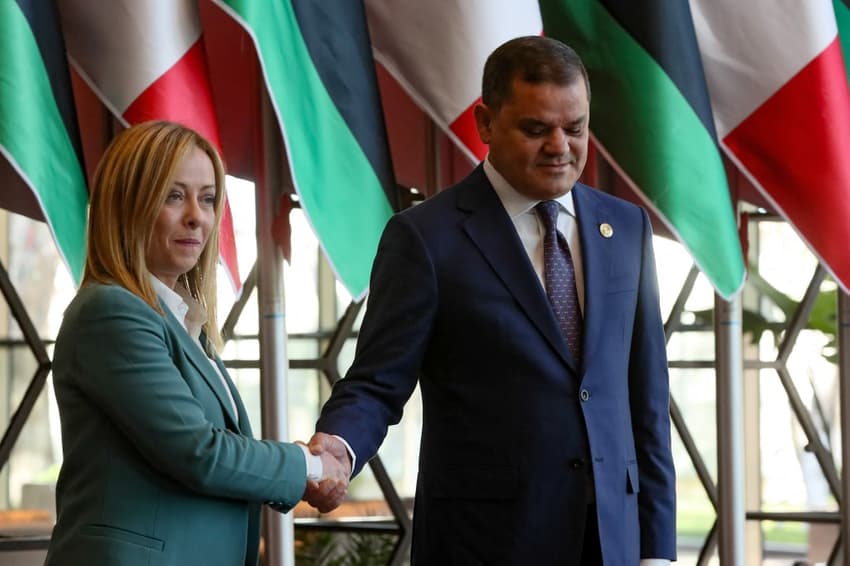Italy's Meloni in Libya to discuss energy and migration

Italian Prime Minister Giorgia Meloni arrived on Saturday in the Libyan capital Tripoli for talks on energy as well as the thorny issue of migration, Libyan state media said.
Meloni's trip - her second to a North African country this week - is the first by a European leader to war-battered Libya since her predecessor Mario Draghi's visit in April 2021.
State television said the Italian premier was received by Abdelhamid Dbeibah, who heads the Tripoli-based, UN brokered Government of National Unity which is contested by a rival administration in the east.
Libya and its former colonial power Italy are key trade partners, particularly in energy, where Italian giant Eni plays a major role in tapping into Africa's largest known oil reserves.
Meloni was accompanied by Eni chief Claudio Descalzi, who is expected to sign a deal with Libya's National Oil Company to develop two Libyan offshore gas fields.
Eni will invest $8 million in the two fields, NOC chief Farhat Bengdara said in televised remarks this week, adding they are expected to produce 850 million cubic metres of gas.
Meloni visited Algeria on Monday seeking supply deals from Africa's top gas exporter to help reduce reliance on Russia after it invaded Ukraine last year.
During her trip to Libya, she is also expected to discuss the issue of migration amid rising numbers of irregular migrants from Libya to Italy.
Libya has been wracked by years of conflict and division since a NATO-backed revolt toppled dictator Moamer Kadhafi in 2011.
The country is a conduit for thousands of people each year fleeing conflict and poverty across Africa, seeking refuge across the Mediterranean in Europe.
Meloni's far-right government took office in October, vowing to stop migrant landings in Italy, which reached more than 105,000 in 2022.
The central Mediterranean route is considered the world's most treacherous, according to the International Organization for Migration, which estimated that 1,377 migrants had disappeared on that route last year.
Comments
See Also
Meloni's trip - her second to a North African country this week - is the first by a European leader to war-battered Libya since her predecessor Mario Draghi's visit in April 2021.
State television said the Italian premier was received by Abdelhamid Dbeibah, who heads the Tripoli-based, UN brokered Government of National Unity which is contested by a rival administration in the east.
Libya and its former colonial power Italy are key trade partners, particularly in energy, where Italian giant Eni plays a major role in tapping into Africa's largest known oil reserves.
Meloni was accompanied by Eni chief Claudio Descalzi, who is expected to sign a deal with Libya's National Oil Company to develop two Libyan offshore gas fields.
Eni will invest $8 million in the two fields, NOC chief Farhat Bengdara said in televised remarks this week, adding they are expected to produce 850 million cubic metres of gas.
Meloni visited Algeria on Monday seeking supply deals from Africa's top gas exporter to help reduce reliance on Russia after it invaded Ukraine last year.
During her trip to Libya, she is also expected to discuss the issue of migration amid rising numbers of irregular migrants from Libya to Italy.
Libya has been wracked by years of conflict and division since a NATO-backed revolt toppled dictator Moamer Kadhafi in 2011.
The country is a conduit for thousands of people each year fleeing conflict and poverty across Africa, seeking refuge across the Mediterranean in Europe.
Meloni's far-right government took office in October, vowing to stop migrant landings in Italy, which reached more than 105,000 in 2022.
The central Mediterranean route is considered the world's most treacherous, according to the International Organization for Migration, which estimated that 1,377 migrants had disappeared on that route last year.
Join the conversation in our comments section below. Share your own views and experience and if you have a question or suggestion for our journalists then email us at [email protected].
Please keep comments civil, constructive and on topic – and make sure to read our terms of use before getting involved.
Please log in here to leave a comment.